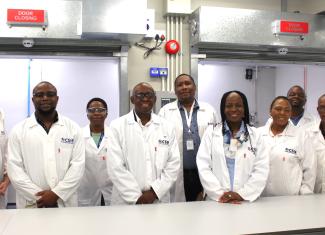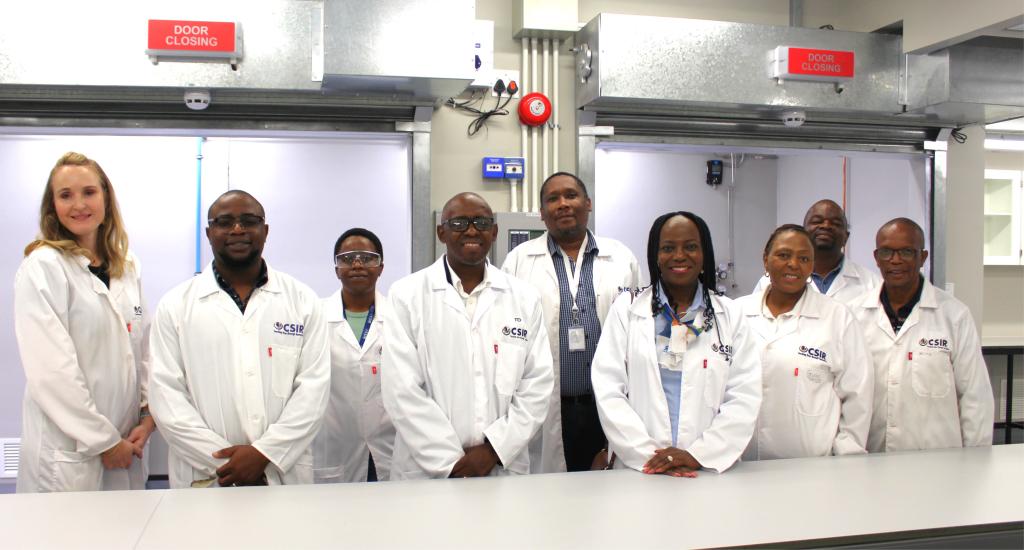The CSIR
prepares for future pandemics

The COVID-19 pandemic may have exposed Africa’s heavy reliance on external medical supplies but the Council for Scientific and Industrial Research (CSIR) is vigorously preparing for future pandemics, and Dr Rachel Chikwamba is at the forefront of it.
A Group Executive for Advanced Chemistry and Life Sciences at the CSIR, Chikwamba emphasised the importance of pandemic preparedness in an interview with Public Sector Manager magazine.
“Pandemic preparedness and response involve improving global access to medical interventions, building more agile and resilient local health systems, and anticipating potential barriers to equitable access,” she explained.
She added that African countries should always be proactive in pandemic preparedness through innovative medical countermeasures accessible to African populations and beyond at a fraction of the cost.
Beyond pandemic preparedness, Chikwamba said the import of high-value biological medicines to treat growing chronic diseases like diabetes, cancer and heart disease contributes significantly to the negative balance of payments, with pharmaceuticals being the fifth-largest contributor to the deficit.
Home-grown solutions
To address the challenge of relying on imported medical supplies, the CSIR is making strategic investments in key infrastructure.
“Health as we know it is a question of security. If you are not healthy, then you are vulnerable. The COVID-19 experience taught us that the capability to make your own vaccines, medicine diagnostics is strategic capability and that waiting on other countries to supply our needs puts us in a vulnerable state,” she said.
Chikwamba added that South Africa should never find itself waiting on the line to receive vaccines in the future, like it did during COVID-19.
“It is not a question of “if” but when the pandemic will come, and because we do not know when, we can only monitor the signals in the environment. We need to be prepared and protect our country,” said Chikwamba.
She emphasised that it is time for South Africa to start manufacturing its own medicines and vaccines. This would allow the country to control both production volumes and pricing, ultimately reducing its reliance on imports and gaining more self-sufficiency in healthcare.
Launching the FuturePharma facility
She made this statement as the CSIR gears up to officially launch one of its key strategic initiatives, the FuturePharma facility. The facility is set to manufacture small-molecule and biologic active pharmaceutical ingredients using cutting-edge pharmacological technology.
“The FuturePharma infrastructure will go a long way in contributing to local production of clinical grade. It offers an adaptable space for hybrid batch-flow process development and is compliant with current Good Manufacturing Practices. This facility will also support process engineering, digital integration and small and medium enterprise development in the pharmaceutical sector,” she explained.
The project aligns with CSIR’s current strategy which was updated in 2017. This strategic direction aims to significantly enhance the CSIR’s impact on industrial development.
“A particular area for my team and I was envisioning how this could yield results in the pharmaceutical sector, and we drew up a vision for FutureParma in 2018 to build a facility with multiple capabilities to make all types of medicines, including small-molecules, protein biologics, hormones, factors, therapeutics, vaccines and others,” she explained.
Research-based solutions
Upon analysing the pharmaceutical sector, they found that a significant portion of spending goes toward importing medicines. South Africa’s pharmaceutical industry is currently valued at approximately
US$2.8 billion (R48. 5 Billion at the average rate of R17.33) and is projected to reach nearly
US$4 billion (R69 billion) by 2030. However, less than 10% of this market is supplied by locally manufactures products.
“South Africa imported US$2.33 billion (R40.35 billion) worth of pharmaceutical products in 2023 (R43 Billion at the South Africa imported US$2.33 billion (R40.35 billion) worth of pharmaceutical products in 2023 (R43 Billion at the 2023 average rate of R18.45). In the same year, South Africa's pharmaceutical exports were valued at US$456.6 million (R8.4 Billion at the 2023 average rate of R18.45). We needed to do something to reduce this through facilitating local production of pharmaceuticals,” she explained.
Leaving no one behind
The team also observed a significant imbalance in the consumption of pharmaceutical products due to the importation of high-value, expensive medicines. As a result, around 16% of the population – those who can afford private healthcare – consume approximately 84% of the country's pharmaceutical expenditure. She pointed out that this is unfair, as it leaves the majority of the population without access to essential, high-value medicines. Local pharmaceutical production, she explained, would help make these medicines more affordable and accessible to a larger portion of the population.
After drafting the vision, Chikwamba and her team designed the necessary infrastructure to support local medicine production. They envisioned a facility where all stages of the manufacturing process could take place in one location. This integrated setup ensures the medicines meet the standards required for clinical trials within South Africa.
Funding
With funding from the National Treasury and allocated resources from CSIR, Chikwamba and her team successfully established a facility capable of producing clinical-grade pharmaceuticals to be manufactured locally. Additional support came through grants from international organisations, private sector stakeholders and a Parliamentary grant, which were used to purchase equipment for the facility.
“We hope to launch this facility in October [this month] as part of the celebrations and invite the industry to join us so that they can also contribute their ideas and make a global contribution from the facility,” she said.
Although South Africa currently depends heavily on imported medicines, it does export certain pharmaceuticals, including child immunisation vaccines. However, the volume of these exports remains minimal compared to its imports. This is set to change, thanks to FuturePharma.
About Chikwamba
Boasting more than 20 years of experience in the public sector, Chikwamba joined the CSIR in 2004, after serving as a postdoctoral research associate at Arizona State University in the United States.
In her current role, Chikwamba works closely with academic institution, as well as the public and private sector partners both locally and internationally, to drive innovation that enhances competitiveness and economic performance.
Chikwamba is specifically interested in translating research into real-world impact, particularly across the CSIR’s biomanufacturing programmes, which include vaccines, pharmaceuticals, and therapeutics. She is also deeply involved in biotechnology applications that support industry development and agro-processing initiatives that add value to agricultural outputs.
For Chikwamba, serving the public is a privilege. She believes that public servants should strive to leave a lasting legacy – one marked by meaningful contributions to the lives of ordinary citizens. Over her two decades at the CSIR, she has already demonstrated this commitment through her impactful work.




